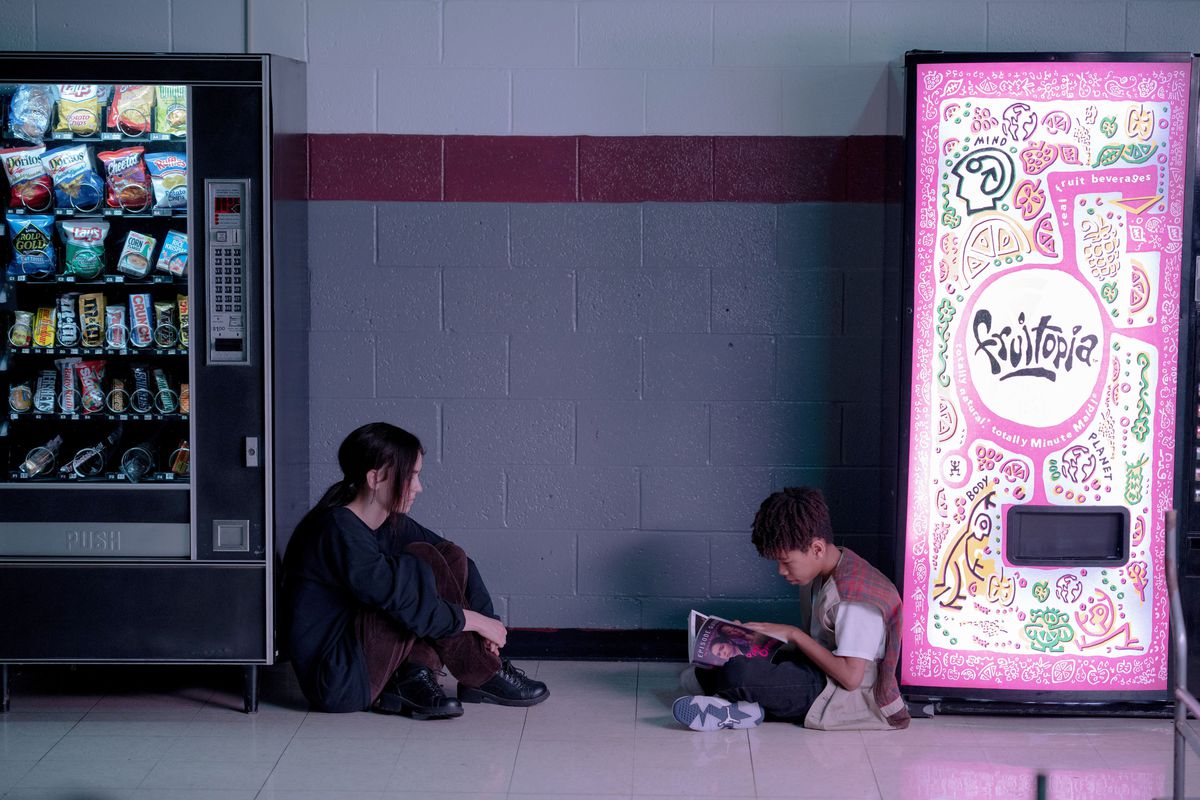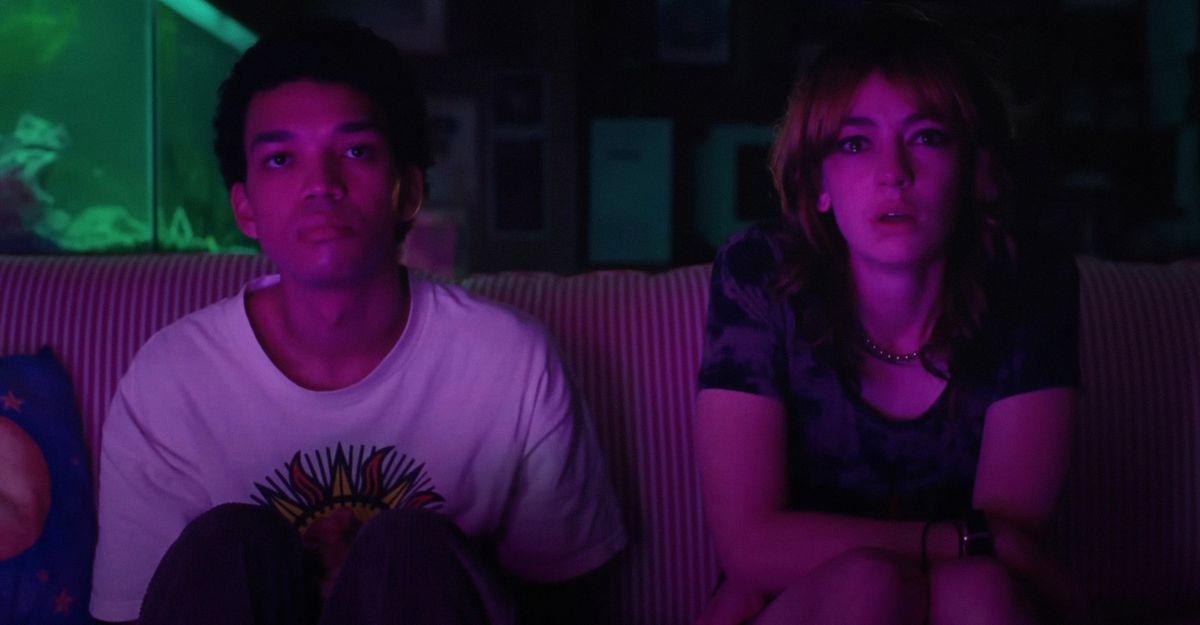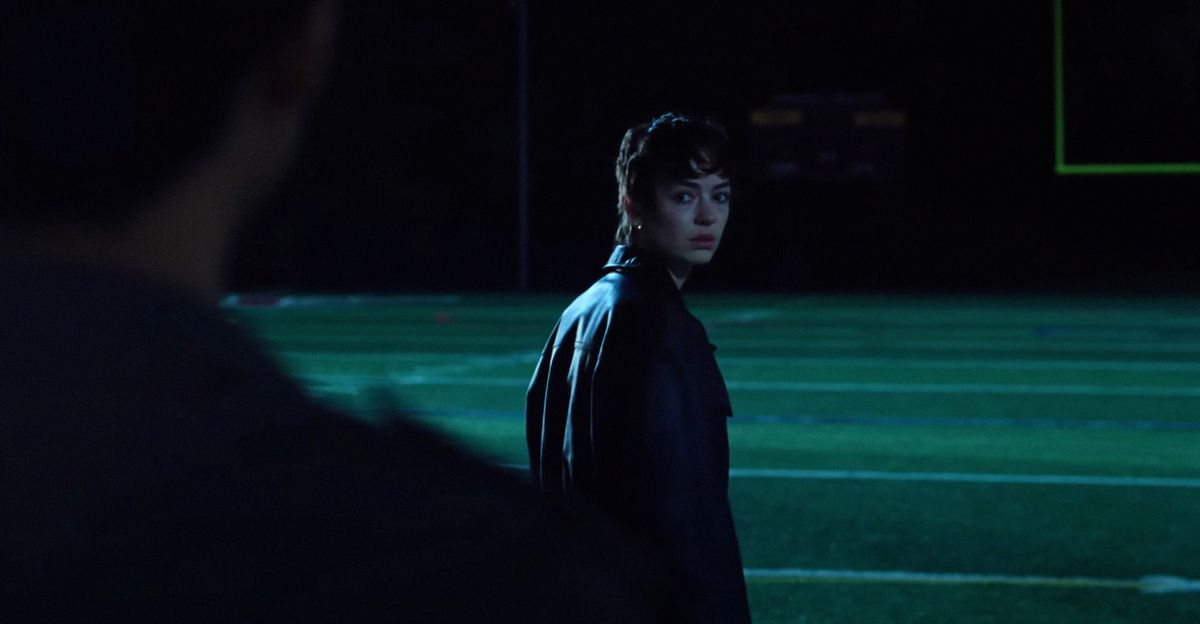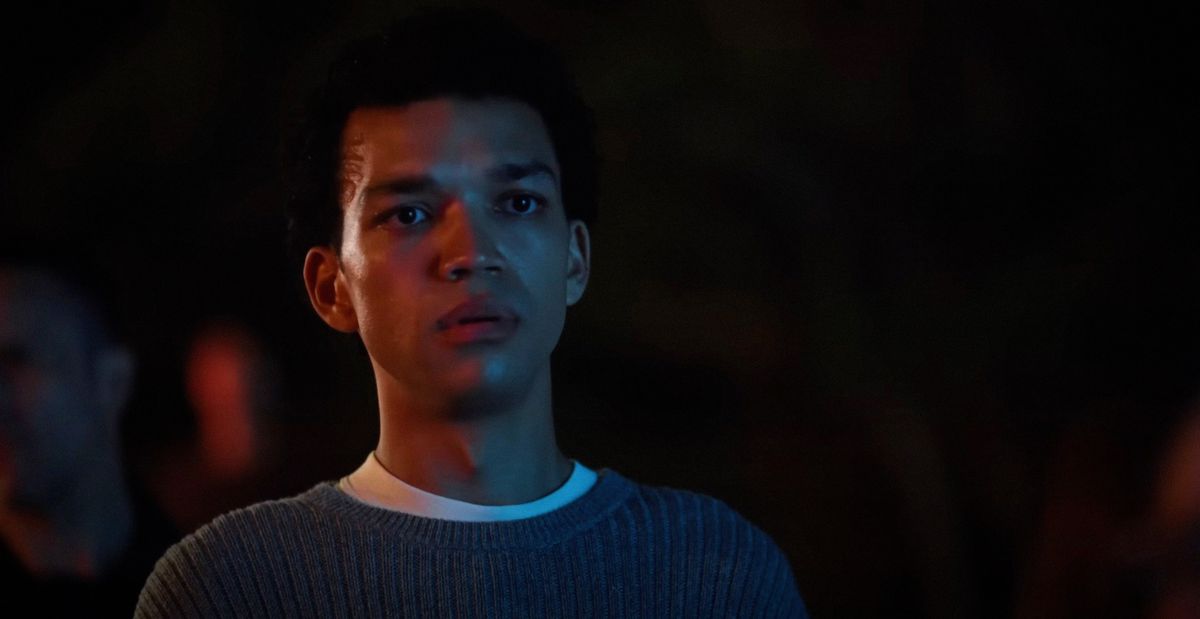Once you start talking about Jane Schoenbrun’s I Saw the TV Glow, it’s hard to stop. Their eerie, tragic follow-up to the underground hit We’re All Going to the World’s Fair is endlessly layered and unpackable, from its complicated central metaphor about trans coming-out to its close links to Buffy the Vampire Slayer and other media to that indelible, hard-hitting ending.
While there’s plenty to talk about throughout the movie, we keep coming back to the ending, in part because we’ve seen an interesting split in how people are interpreting it. Like the ending of Inception, like the ending of Challengers, the end of TV Glow prompts viewers to see different things in the same images and the same moments. Here at Polygon, we’re seeing the same split in our own writers… and you know what that means. It’s time for another case file at Polygon Court.
Polygon Court is where we take our divisive pop culture conflicts, as we did when we debated the alternate ending of James Cameron’s Titanic, the most important part of the Fast & Furious franchise, the problem of Spider in Avatar: The Way of Water, the song cut from The Muppet Christmas Carol, and the mysterious, maybe problematic ending of All of Us Strangers. So pull up the stenograph and get ready to take notes (and take sides), because court is in session.
[Ed. note: End spoilers ahead for I Saw the TV Glow.]
The ending of I Saw the TV Glow

The quick summary: I Saw the TV Glow follows decades in the life of Owen (Ian Foreman as a young teenager, Justice Smith thereafter), a shy, deeply awkward, lonely young man who finds solace in a late-night cult TV show called The Pink Opaque. He’s lured into the show’s fandom by a slightly older teenager, Maddy (Brigette Lundy-Paine), who considers the show “more real than real life.” Maddy desperately wants to escape their small town, and sees The Pink Opaque as a form of escape. The show centers on two girls, Isabel and Tara, who share a psychic connection, which they use to fight the sinister Mr. Melancholy and his evil agents.
Eventually, Maddy runs away from home — she invites Owen to join her, but he’s too afraid to leave. Eight years later, Maddy returns, telling Owen that The Pink Opaque is real, she is actually Tara, he is actually Isabel, and that in the real world, Isabel has been captured by Mr. Melancholy, who buried her alive, using his potions to hold her in an illusion and prevent her from escaping. Owen’s entire life is that illusion. Maddy says she can break Owen out of it before Isabel dies, but he needs to undergo the same dangerous, frightening ritual she put herself through, allowing herself to be buried alive so she could get back in touch with herself as Tara and force her way through the illusion.
Owen refuses, and Maddy retreats, telling him he still has time, but not infinite time. Decades go by in the blink of an eye. The Pink Opaque changes in an unsettling, disappointing way. Owen claims he’s happy enough, but he seems disconnected, drifting, and miserable — until one day, at his job at an arcade, he snaps and screams that he’s dying, that he needs help. Everything around him freezes, and no one seems to notice what he’s said. He retreats to the bathroom, where he cuts open his chest and sees the static glow of his television inside himself — but he just returns to the arcade, where he apologizes to every customer he sees for his outburst, even though none of them acknowledge him or seem to notice. And that’s where the movie ends.
Opening statements: The light within, the darkness without

Tasha: Pete, I was shocked to hear you see a light at the end of the tunnel after all that! I wrote about the end of the movie specifically because I felt the finale was so bleak, dark, and sad that I felt it was designed as a severe warning to anyone facing a difficult life or an uncomfortable decision. It left me unsettled and shaken. I admire Schoenbrun for the courage of their convictions, and for creating something so emotionally moving, and the more I think about the movie as a whole, the more I admire it. But certainly not for its sense of hope! You see it differently?
Pete: I do! Like you, I have so much respect for this film. I loved the movie when I first saw it, and I’ve only grown to love and appreciate it more with every passing day. It’s rare to have a movie like this, where even people who have completely opposite readings of it than I do only make me appreciate the depth and complexity of what Schoenbrun has done here more. I Saw the TV Glow is a true, rare masterpiece, and a movie that fills me with a sense of fulfillment just thinking about it.
Presentation of evidence: Is there hope in the end of I Saw the TV Glow?

Pete, the case for hope: Yes, I do see a glimmer of hope at the ending, but I understand why some audiences do not. As with the rest of the movie, I think Schoenbrun deftly leaves some things open for interpretation, while clearly signaling others. The movie is ripe for all sorts of allegorical interpretations, on top of the very present trans story on the surface.
For me, the ending suggests a breakthrough for Owen — but the kind of breakthrough that isn’t easy. Truly discovering yourself is a hard process, and one that comes with ups and downs, even through the beauty of finding a real truth. It can be an embarrassing experience to reinvent yourself — hence Owen’s constant apologies to anyone nearby — and I think the film beautifully showcases the complex, seemingly oxymoronic emotions that come with self-discovery.
Tasha, the case against: I sure understand why people would want to see the end as a breakthrough for Owen, a step forward that’s going to lead him somewhere safer and happier. I recently recorded a podcast about the movie with trans critic/author/screenwriter Emily St. James, and she mentioned that over on AO3, people are already starting to write fanfic about Owen and Maddy’s future — a natural response to being left in such a dark place.
I just don’t see it on screen at all. The fact that he literally opens himself up to discover what’s inside him is a potent visual symbol — especially given his revelation earlier in the film that he feels like he’s empty, like someone hollowed him out. When Maddy tells him Mr. Melancholy literally cut out Isabel’s heart and put it in a refrigerator, that explains both his feeling of hollowness and what he sees when he cuts his chest open. (That act could also be debated as a metaphor for gender-confirming surgery.)
And then there’s the fact that seeing the TV glow inside himself is the first really overt supernatural thing he’s experienced, the first thing that might confirm Maddy’s story as something other than a delusion. (Depending on how he personally experienced that aborted moment where he stuffs his head into his own television and his creepy Fred Durst father drags him out.)
So the fact that he responds to all of that weighty coming-together of story and vision and explanation by closing himself up, going back to his job, and apologizing to everyone he sees is stunning to me. I don’t see it as suggesting he’s had a life-changing revelation, I see it as him suppressing his new knowledge, denying it, and trying to go back to normalcy. Did you see anything overt on the screen that keys you into a different future for him? Or is it more about a vibe and a hope?
Pete, the case for hope: To me, the fact that Owen is finally willing to look inside himself at all, in a way that is depicted so graphically and intimately, is a win on its own. That moment gives me hope for his future — that first, terrifying step is the most important one on the path to self-discovery. In some forms of self-discovery, it’s harder before it gets better.
And I think we know enough about the town and environment Owen is in to know that is true of this situation. It wouldn’t feel genuine to me for Owen to come out in celebration after this moment of self-discovery, and just have all the answers — it’s the spark that starts what’s going to be a difficult but fulfilling process.
As the sidewalk chalk puts it, when Schoenbrun’s camera pans over a piece of street graffiti after Maddy leaves: “There is still time.” There is still tragedy in the moment — as critic Willow Catelyn Maclay puts it in an excellent review of the film, “there is still time, but only so much.” But I do believe that it is the first, important step on Owen’s path to being happy. There is still time for Owen, and for everyone. It isn’t too late to find yourself, no matter how far along in your journey you wait to truly look.
Of course, I choose to believe that, but I think Schoenbrun’s comments about this support my reading of the ending. In an interview with Maclay, they said, “I don’t necessarily think that in a portrait of transness we need to see the person that they were before the egg cracked, or the person that they were after the egg cracked, or the person that they want to be. I don’t think we need an entire lifetime’s worth of growth to understand somebody.”
Schoenbrun has described this moment at the end of the film for Owen as the moment of the egg cracking, and I think they want to leave what’s next intentionally open, because this film is precisely about that moment of self-discovery — not necessarily about what happens next. I can understand why that might feel unfulfilling to some people, or why it could be interpreted to mean Owen will remain in the closet. But I choose to see it as the start of Owen’s next chapter.
Tasha, the case against: That’s a compelling argument! I know Schoenbrun is drawing from their own journey of self-discovery here, so we can potentially look to where they ended up to suggest where Owen might end up. It’s good to know they don’t think of this as the absolute end for Owen, in spite of the long delay and the threat to Isabel.
I still don’t see anything in this movie that gives me hope for him personally, though, given how consistent he is about resisting. But… I want to! Maybe this is just a “glass half empty/glass half full” lady-or-the-tiger story situation, where what you see in the ending says more about you and your bent toward cynicism or optimism than it says about what Schoenbrun actually puts on the screen. Maybe I just need to fight my own cynicism here.
Looking at another quote from Schoenbrun, though, talking to Entertainment Weekly about the ending, I think it’s also clear that they wanted to leave the movie open to that cynical read, because of a sense that an optimistic read would feel unrealistic, and wouldn’t affect audiences the same way:
I think it takes years, if not a lifetime, to undo that damage [of being constantly pushed to suppress a trans identity]. And to undo it in our case in 2024, in a world where, at best, cis people want to be PC and nice and use the right pronouns but don’t see me the way that I want them to, and, at worst, want me dead — it’s kind of psychotic, and for the movie to end in any way beyond this, like, fledgling, furtive, maybe a first step that’s still rife with trauma and all of the consequences of it, would have felt to me like I wasn’t doing my job as an artist.
Speaking of what Schoenbrun achieves as an artist here, Emily wrote about the ending for Vulture, and I had the chance to preview that piece. It hasn’t been published yet (I’ll link it here when it goes up), but she has some insights I think are particularly enlightening about how the movie ends in such an ambiguous, unresolved way because that “gnawing sense of dissatisfaction,” the sense of melancholy and disconnection, is meant to leave cis people with “contact-high gender dysphoria.” I don’t know if that was part of Schoenbrun’s thinking at all, but the idea that the movie has to end in an ambiguous way to provoke a sense of recognition and understanding strikes me as powerful and daring.
Closing statements: The many layers of TV Glow

Pete, the case for hope: I deeply appreciate how ambiguous TV Glow is, how open it is for all sorts of interpretations, and that Schoenbrun does not give in to easy answers. That’s one of the things I find most fascinating in this movie, that our colleague Austen Goslin put very well when I was discussing the movie with him: Many examples of cinema in the trans canon are movies that are not textually trans, but can be read subtextually as trans. This is a movie that is textually trans, but can be read subtextually in all sorts of other different directions.
It makes the movie much more discussable, for sure, but it’s also a breath of fresh air in an environment that seems to require an unreasonable amount of clarity from challenging art. Even the quotes you dropped in above — I read them in support of my take on the ending, you read them in support of yours. Cinema! Gotta love it.
My interpretation of the ending comes down to this: Not all forms of self-discovery and change are created equal. Sometimes, it becomes harder before it gets better.
Such a massive moment of self-discovery shakes people to their very core. Yes, you may find some semblance of truth hiding within yourself, but that’s also a revelation that you’ve been living your life as a lie — lying to yourself, and to everyone else around you. In this light, Owen’s actions after that moment of discovery make complete sense to me. Owen’s life isn’t over just because the movie is over, and the end gives the opportunity for a choice. A choice where Owen no longer lives as a shell of a person, no matter how hard it remains to get there.
As Schoenbrun said on an excellent episode of Tuck Woodstuck’s Gender Reveal podcast: “What comes first are the negative consequences, not the positive ones.”
Tasha, the case against: Amazing. Well, amid all the other things this movie is about, it’s about working on yourself, and finding a path to a more satisfactory, centered life. I’m going to take that note, and go work on my cynicism problem.